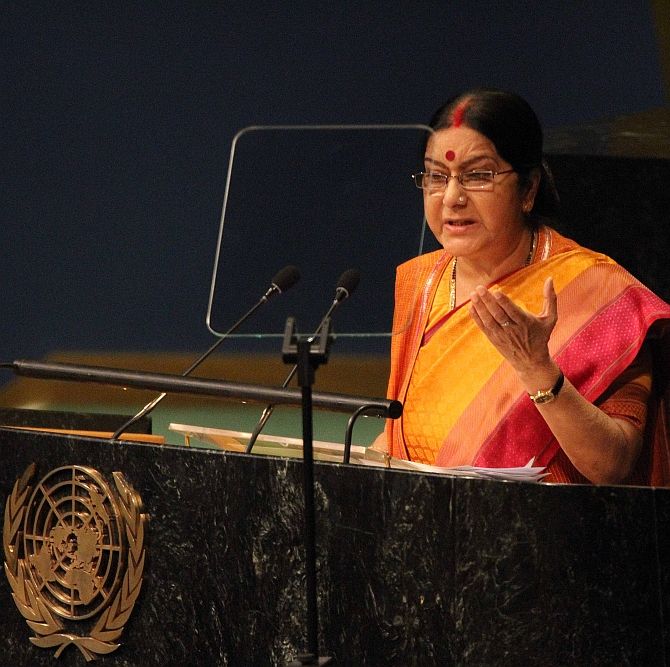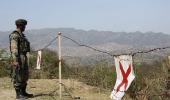'The call to isolate Pakistan on the ground of sponsoring and supporting terrorism, particularly when the UN has not even defined terrorism, is a wild goose chase.'
'The responses of various countries to the Uri attack provides testimony to this fact.'
'No country, not even Russia, was willing to condemn Pakistan for this dastardly act,' says Ambassador T P Sreenivasan.

Addressing the UN General Assembly, the minister of external affairs, Mrs Sushma Swaraj suggested, for the first time, that Pakistan should be isolated for not joining the fight against international terrorism.
This was more an emotional and rhetorical call than a thought out proposal for action by the other member States.
Isolation of any member State by the others is an action taken only in exceptional circumstances as every State has the right to pursue its own policy, with the option not to join any international arrangement.
Isolation of Pakistan, on account of not joining the consensus, even if there is one, is not a practical proposition.
In reality, the minister admitted that the Indian proposal for a Comprehensive Convention on Terrorism has not gained traction. It is stuck on the question of the definition of terrorism because one man's terrorist is often another man's freedom fighter.
In the absence of a consensus on this issue, there is no ground for isolating Pakistan.
On the other hand, Pakistan repeatedly claims that it is a victim of terrorism and that it is willing to fight terror. It was even a partner of the United States in the war against terror at least in name.
The history of the United Nations shows that some kind of isolation was imposed only on South Africa on account of apartheid. India was the first country to raise the issue of apartheid and it took us many years to persuade other countries to impose sanctions.
Many had argued for many years that apartheid was an internal matter of South Africa even after the liberation struggle assumed the proportions of a civil war. An arms embargo and sanctions came much later.
Isolation of South Africa was never complete even after a majority of States wanted South Africa to be isolated. Several neighbours of South Africa, even while supporting the sanctions in principle, continued to have trade and other dealings with the apartheid regime for the sake of survival. South Africa, even with a despicable regime, was necessary for them.
In the case of Israel, there is near universal consensus that it is guilty of defying the United Nations by occupying Palestinian territory and there is a body of resolutions, demanding that Israel should withdraw to its 1967 borders.
The Israeli settlements on Palestinian territories were universally condemned, but no isolation was possible even when violence broke out in Gaza. No sanctions were possible except those imposed by individual countries.
After the normalisation of relations by Egypt following the Camp David Accords, Israel became more and more acceptable even without any change in policy on its part.
When it comes to non-proliferation, the shoe is on India's foot. India, Pakistan and Israel became virtually isolated when all other countries joined the NPT, which was considered a grand bargain between the Nuclear Weapon States and non-nuclear weapon States.
There were several occasions when countries like Canada and Australia called for isolation of those countries which did not sign the treaty. After the NPT was declared a perpetual treaty without any possibility of modification, it was stated by some that those who did not sign the treaty were not entitled to be responsible members of the international community. But such rhetorical statements were not taken seriously and we ourselves fought tooth and nail any effort to isolate us.
We stuck to our position that the treaty was discriminatory and we had every reason to remain out of it. When any isolation or sanction was not possible even in the case of a near universal treaty, it is unthinkable that Pakistan can be isolated on the ground of violating an anti-terrorism regime that has no legal sanction in the United Nations.
The worst case of pressure applied on India to comply with an international treaty was at the time of the Comprehensive Test Ban Treaty.
Contrary to the established international practice, India was threatened with sanctions if we did not sign and ratify the CTBT. India was among the designated countries, without whose signature the CTBT would not come into force.
But despite all those pressures, India was not isolated in any manner. We tested in 1998, faced US sanctions and came to an understanding with the international community through a set of measures, such as a moratorium on testing, a non-first use of nuclear weapons principle and a continuing commitment to disarmament.
The case of North Korea is another one in which the worst form of defiance of international public opinion did not result in its total isolation.
In fact, the United States used a mix of punitive measures and incentives to bring North Korea back into civilised behavior. With powerful backing of China, North Korea has continued in the UN. Its request to withdraw from the NPT was never accepted by the UN Security Council, but it continues to test nuclear devices and missiles.
A review of the efforts to isolate nations will thus reveal that it is not easy to ostracise them. The criteria for membership of the UN are so general that punitive measures are not easy to take.
All members have to be peace loving States, but who is going to define which countries are peace loving?
The call to isolate Pakistan on the ground of sponsoring and supporting terrorism, particularly when the UN has not even defined terrorism, is a wild goose chase.
The responses of the various countries to the Uri attack provides testimony to this fact. No country, not even Russia, was willing to condemn Pakistan for this dastardly act.
India-Pakistan exchanges have become, over the years, a ritual. The points we score over Pakistan in these debates are illusory at best.
Is there anything else that India can do to isolate Pakistan?
All the measures, such as surprise attacks, suspension of the water treaty, withdrawal of MFN status, trade sanctions etc will be purely bilateral in nature and will not affect others.
No follow-up action can be expected from other nations. The only silver lining is that Afghanistan, Bangladesh and Bhutan have decided to keep away from the SAARC summit, following our lead. But it is far from certain that they have done it in protest against the Uri attack.
IMAGE: External Affairs Minister Sushma Swaraj addresses the United Nations General Assembly in New York, September 26, 2016. Photograph: Paresh Gandhi/India Abroad
Ambassador T P Sreenivasan is a former Ambassador of India and Governor for India of the IAEA. He is currently Director, NSS Academy of Civil Services and Director General, Kerala International Centre.










